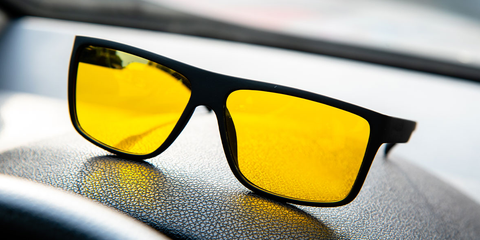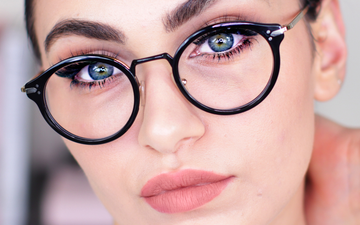
Night driving can be a challenging experience for many, with the glare of headlights, low visibility, and the added stress of fatigue. In the quest for a safer and more comfortable driving experience, night driving glasses have gained popularity. However, recent research from Harvard University's Schepens Eye Institute raises questions about their effectiveness. In this blog post, we'll explore why night driving glasses might not be worth the investment and why prescription glasses could be your best bet for improved night vision.
What are night driving glasses?
Night driving glasses are specialized eyewear designed to improve visibility and reduce glare while driving at night. They typically feature yellow-tinted lenses that filter out blue light, aiming to enhance contrast and minimize the harsh effects of headlights and streetlights. By reducing glare and improving overall clarity, The marketing behind these glasses promises a safer and more comfortable nighttime driving experience, but do they deliver on these claims?
Research on night driving glasses
Researchers at Harvard University's Schepens Eye Institute conducted an in-depth study to evaluate the effectiveness of night driving glasses. Their findings were eye-opening:
Minimal Impact on Glare Reduction: The study found that while night driving glasses did reduce glare to some extent, the difference was not significant enough to warrant their use.
No Improvement in Vision: Participants did not experience a notable improvement in their ability to see clearly or react to road hazards while wearing night driving glasses.
Potential Risk of Overconfidence: The perceived benefits of night driving glasses might lead drivers to overestimate their nighttime driving capabilities, potentially increasing the risk of accidents.
The Superiority of Prescription Glasses
For those who struggle with vision issues, prescription glasses are the most reliable option for night driving.
Customized Vision Correction: Prescription glasses are tailored to your specific vision needs, ensuring you have the clearest possible view of the road.
Anti-Reflective Coating: Many prescription glasses come with an anti-reflective coating that reduces glare from headlights and streetlights, enhancing your night vision.
Understanding Anti-Reflective Coatings
High-Quality Lenses: Prescription lenses are typically made from high-quality materials that offer superior clarity and durability compared to over-the-counter night driving glasses.
Tips for Safe Night Driving
Even with the best glasses, there are additional steps you can take to ensure a safer night driving experience:
Keep Your Windshield Clean: A clean windshield reduces glare and enhances visibility.
Adjust Your Headlights: Make sure your headlights are properly aligned and clean to maximize their effectiveness.
Take Breaks: Driving at night can be tiring. Regular breaks can help you stay alert.
Stay Focused: Minimize distractions and keep your attention on the road.
So, investing in a good pair of prescription glasses tailored to your vision needs is the best way to enhance your night driving capabilities.





